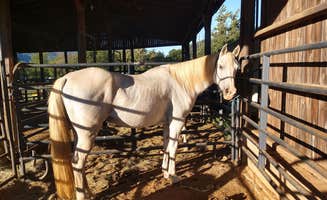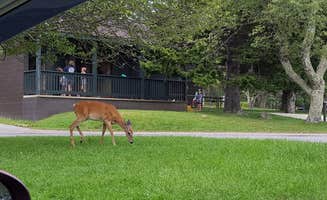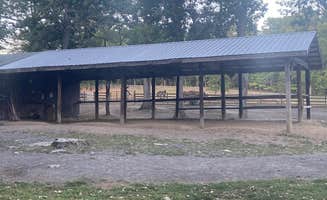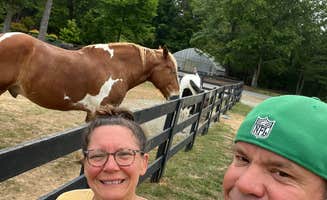Horse camping near Rixeyville offers open field camping with natural scenery and varying terrain. Located in the eastern foothills of the Blue Ridge Mountains at approximately 500-650 feet elevation, the area has moderate humidity and temperatures typically ranging from 30-85°F across seasons. Most equestrian campsites aren't reservable in advance, requiring early arrival to secure spots.
What to do
Trail riding access: Fort Valley Ranch provides trail access connecting directly to paths through George Washington National Forest. "We recently stayed at Fort Valley Ranch Campground, near Luray, VA and I can only say good things about our experience. Within a 10-minute drive, there are opportunities for hiking and river activities. We found a river access point perfect for swimming and wading," notes Jason G.
Fishing opportunities: Several camping areas offer fishing as an alternative activity when not riding. At The Cove Campground, "The beach is large and clean. The lake was very nice and would be the perfect place to cool off on a hot summer day," reports Andy S.
Hiking exploration: The Shenandoah region offers numerous hiking trails at various difficulty levels. "There are miles of trails and waterfalls nearby," mentions Rachel M. about Big Meadows Campground, adding that it's excellent "for the star watching at night."
What campers like
Open field layouts: The large field designs at many equestrian campgrounds provide spaciousness and flexibility. "Big Meadows Campground was wonderful... Large site size. We had site 23," shares Terri S., explaining the generous space available for both horses and camping equipment.
Wildlife viewing: Many equestrian campers appreciate the natural animal encounters. Kim L. notes at Big Meadows that the "campground is meticulously clean with daily restroom cleaning and trash pick up. Very small campground store on site but a much larger store at visitor center."
Amenities variety: Shenandoah Crossing offers additional luxury options beyond basic camping. "Big beautiful paved sites with furniture to boot. Complete with gas grills and outdoor sinks. Plenty to do at the resort... Kayak, putt putt, tennis, swim in one of the pools, hot tub, work out in the gym, walk on trails, ride horses," describes Nicole P.
What you should know
Limited cellular coverage: Most equestrian camping areas have spotty or nonexistent cell service. At Trout Pond Recreation Area, Chris J. notes "At the end of the season last year, they were installing a pay phone, which is helpful because there is no cell service. In case of an emergency, you are a 20 minute drive to call for help."
Restroom conditions: Bathroom facilities vary significantly between campgrounds. Laure D. explains at Trout Pond that "There are 3 not so great bath houses and the only reason I didn't give 5 stars. Only 1 sink, 2 stalls, and 1 shower in each and a stall in 2 of them was out of order."
Weather considerations: The area's elevation affects temperature and conditions. "Mid-August was a gamble as to weather. It was gorgeous weather! In the valley and surrounded by beautiful mountain views it was 80 daytime and ~60 at night," reports Laure D. about camping in the region.
Tips for camping with families
Child-friendly activities: Several camps offer structured activities for younger visitors. At Bull Run Regional Park, "The campground had a climbing wall on one afternoon. There are miles of trails and my gkids enjoyed the nature scavenger hunt. You even get a prize when you finish," shares Bridget H.
Space considerations: Look for sites with enough separation for family comfort. "Though this campground is HUGE, the sites are not piled on top of each other. Our site, B112, was surrounded by shrubs under the canopy of trees which provided tons of privacy," notes Veronica S. about Big Meadows.
Insect preparation: Bug activity varies by season and location. According to Anna R., "We were there during a heat wave so there were bugs but being from Georgia the heat was bearable. The site was a tent site with lots of shade and not too close to others."
Tips from RVers
Leveling challenges: Many horse camping areas have uneven sites. Stuart O. warns about Pohick Bay Campground, "We camped here the last night of the season (Nov30) and shared the campground with a mix of tent campers, car/van campers, and a few larger units."
Water management: Several equestrian camping areas have limited water hookups. Chris K. notes at The Cove, "We stayed in camp one which offered electrical hook ups. There are 4 water spigots in camp 1. However all the travel trailers hooked up, which means you either had to make friends or disconnect their water in order to have access."
Road conditions: Access roads to horse camps can be challenging. Chris J. advises, "There are some pretty steep inclines to even get to the campgrounds. Unless you have a powerful vehicle pulling your camper, it would help to release your water supply and fill up when you get to the campground."





